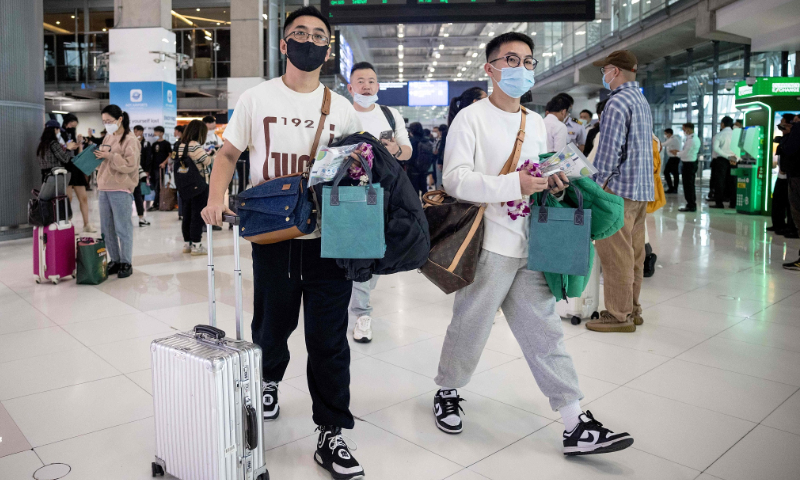Chinese person traveling no different than a person from any other country: senior fellow from CCG

Travellers from a Xiamen Airlines flight arrive at Suvarnabhumi Airport in Bangkok on January 9, 2023, as China removed COVID-19 travel restrictions. Photo: VCG
Japan announced on Monday that travelers from China's Macao Special Administrative Region need to present a negative COVID-19 report taken within 72 hours as well as undergoing a nucleic acid test upon arrival from January 12, in an extension of travel restrictions. China started managing COVID-19 with measures designed for combating Class B infectious diseases, instead of Class A infectious diseases since Sunday, and some countries have been imposing travel restrictions on arrivals from China.
Previously Japan announced the travel restrictions which did not include travelers from Hong Kong and Macao special administrative regions.
The US, Japan and South Korea are among the countries that announced restrictions on travelers from China, citing concerns that the current surge of COVID-19 cases in China could lead to emergence of new variants.
"It is very easy to realize that with COVID now spreading through China's population, the situation is similar to any other country with the potential for new variants to form in the future," Mario Cavolo, a senior fellow of the Center for China & Globalization (CCG) told the Global Times.
To the same degree which has existed during the past three years, new variants always offer risk and concern, Cavolo said. For example, the new XBB variant has recently emerged, first in New York, and recently has been detected in some cities in China as well. However, the indications are that "while it is very contagious, it does not possess any greater severity than the other current Omicron variants circulating."
"It is obvious that a Chinese person traveling is no different than a person from any other country where COVID is also now surging," Cavolo said.
Cavolo said that there is constant and open communication taking place between China's CDC and National Health Commission with the World Health Organization (WHO) and other health organizations. "In hindsight, we have confirmation that COVID existed in several other countries but doctors in those countries had not yet identified it as a new virus threat."
Mutual cooperation between the world's healthcare professionals including China is taking place continuously and is essential, Cavolo noted. Cavolo listed as an example that their teams have already met together twice in the month of December.
"As we all understand, there are malicious western voices who will not allow such a balanced and favorable treatment of the facts to be fairly reported in the public mainstream media including false reporting comparing China's vaccines to the western mRNA vaccines," Cavolo said.
Spokesperson of China's Ministry of Foreign Affairs Mao Ning has stressed at Friday's press briefing that since COVID began, competent authorities of China have shared information about the epidemic with the international community in a timely, open and transparent manner in accordance with law and maintained close communication with the WHO.
On January 5, at the invitation of the WHO, China sent experts to the WHO member states briefing. They explained China's response measures, monitoring of mutations, vaccination and clinical care, and had active interactions with other member states, said Mao.
Global Times


